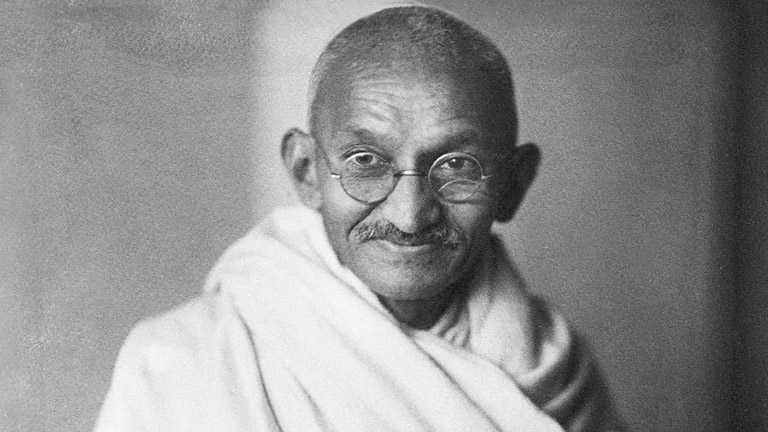By Dr.Mohammad Nazrul Bari,
For us Indians, there is no dearth of inspiring historical personalities to feel proud of. One of them is Mahatma Gandhi, the Prophet of peace, social justice, non-violence and humanity. The famous scientist Albert Einstein rightly said in 1939 on the 70th anniversary of Gandhi’s birthday, “Generations to come will scarcely believe that such person as Gandhi ever in flesh and blood walked upon this earth”.
But unfortunately today Gandhi’s ideas have become the agenda of pseudo- secularists, especially politicians, and his photo frame has now been turned into an item of decoration in the Government offices. It has also become the ritual for us to clean his statue and garlanding his picture and statue on every 2nd October and enjoy the holiday.

The issues raised by him which include emancipation of women, Hindu-Muslim unity, communal harmony, elimination of untoucability, eradication of corruption, combating fundamentalist religious views, etc. are still relevant after 66 years of his gruesome murder.
It is both ironical and deplorable that the Father of the Nation’s ideas and ideals were better read and followed by more outsiders than us. People like Cesar Estrada Chavez, Martin Luther King Jr. and Barrack Obama from USA, Aung San Suu Kyi of Burma, Dalai Lama- a known Buddhist spiritual teacher, Kwame Nkrumah of Ghana, Nelson Rolihlahla Mandela and Desmond Mpilo Tutu from South Africa, John Okwoeze Odey, a Christian priest from Nigeria and Christian Cardinal Tumi from Cameroon are some important people who took inspiration from Gandhian thought on non-violence to fight against social injustice and to achieve freedom from inhuman and hostile environment. To preach his idea of non violence, Gandhi himself accepted that “there are many causes that I am prepared to die for but no cause that I am prepared to kill for.”
Today religious fundamentalism is one of the major sources of tension, violence and suffering in many parts of the globe, including developed countries like U.S.A. and developing and under developed countries of Africa, West and South Asia including Afghanistan, Pakistan and India. Fundamentalism is a frightened religion’s response to the crisis of identity and integrity and consists in seeking to recapture and uncompromisingly assert what it takes to be its fundamental beliefs and practices.
It is also pertinent in this context to understand Gandhian view. He had proven that we can achieve the noble causes of liberty, justice and democracy for humankind without killing anyone, without making a child an orphan, and without making anyone homeless with the damage caused by war and violence.
The name of Gandhi today transcends the barriers of race, region and religion and has emerged as the prophetic voice of our times. He is remembered now for his passionate adherence to the practice of non-violence and humanism. It is true that Buddha and Mahavir reinvented the word Ahimsa (non-violence) but credit goes to Gandhi to use it as an effective instrument for social change and adapting it to suit the globalised fraternity.
His humility in assessing his own contribution to the nation in particular and humanity in general is both appealing and appalling. Gandhi in his book “My Experiments with Truth” said: “I taught nothing new to this world, truth and Ahimsa are as old as trees and mountains”. He was successful in demonstrating to the world the importance of truth and non-violence in achieving peace and prosperity.
The famous historian, Arnold Toynbee, who studied Gandhi once said, “The generation into which I happen to have been born has not only been Hitler’s generation in the West and Stalin in Russia, it has also been Gandhi’s in India; and it can already be forecast with some confidence that Gandhi’s effect on human history is going to be greater and more lasting than Stalin’s or Hitler’s.”
Unfortunately, we the Indians have learned nothing out of Gandhi’s philosophy and produced selfish and greedy politicians but not a leader like Gandhi after Independence.
It is true that people like Gandhi are born once in a millennium. It was Gandhi who accepted it publically that “Let us forget all thoughts of – I am a Hindu, you are a Muslim or I am a Gujarati, you are a Madrasi. Let us think, I and mine in a common Indian nationality. We shall be free only when a large number of our people are determined to swim or sink together.” On another occasion, he famously said when asked if he was a Hindu, “Yes I am. I am also a Christian, a Muslim, a Buddhist and a Jew.”
I am sure, today across the regions, religions and political parties, no politicians can dare to make such kind of bold and strong statements to keep India intact.
It is never too late to retrace the steps and embrace the non-violent path exemplified by Mahatma Gandhi. We must honestly ensure that the philosophy of social justice, communal harmony, and peaceful coexistence prevail for the growth and socio-economic development of every caste, class, and community.
This will be the true tribute to Gandhi, our Father of Nation, instead of garlanding his frame every year and celebrating holiday on 2nd October.
(Dr.Mohammad Nazrul Bari is an Assistant Professor of History at the Central University of Karnataka, Gulbarga.)

